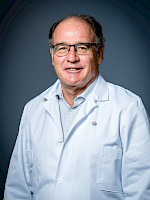Hepatobiliary surgery (liver surgery)
Hepatobiliary surgery, also known as liver surgery, deals with all surgical treatment procedures relating to the liver. Surgery is usually only performed if tumours have formed in the liver. This usually involves a partial removal of the affected tissue.
As the liver is capable of tissue renewal, it regains its normal size after surgery. This makes it possible to operate on the liver several times if necessary.
Treatments
There are a wide range of treatments available. A surgical procedure is performed to remove cysts, parasitic diseases, tumours and metastases.
Surgical treatment of liver tumours is always an interdisciplinary procedure. This means that the surgeon in question works with experts from the fields of radiology, oncology or pathology to achieve the best possible outcome.
In order to perform the procedure in a gentle manner, the liver function and its potential for regeneration are analysed before each operation. This allows the extent of the necessary liver resection to be calculated and the risk of hepatic insufficiency to be minimised.
Surgical treatments
The procedures can be performed in various ways, depending on the clinical picture. Today, most of the operations are performed using the minimally invasive method known as laparoscopy. Surgeons are also increasingly relying on the support of the surgical robot. With the help of 3D video systems, the surgeon can get a very accurate picture of the disease and thus operate in a targeted manner that protects the soft tissue.
If parts of the liver have to be removed, this takes place at what are known as segment boundaries, which divide the liver into eight different segments. To ensure that the liver continues to function after surgery, it is of great importance that sufficient healthy liver tissue is available. After the operation, a long-term rehabilitation phase begins and is supervised by a general practitioner or hepatologist.
In some cases, a liver transplant is necessary. This is carried out by visceral surgeons who specialise in transplants, in the appropriate central hospitals.


